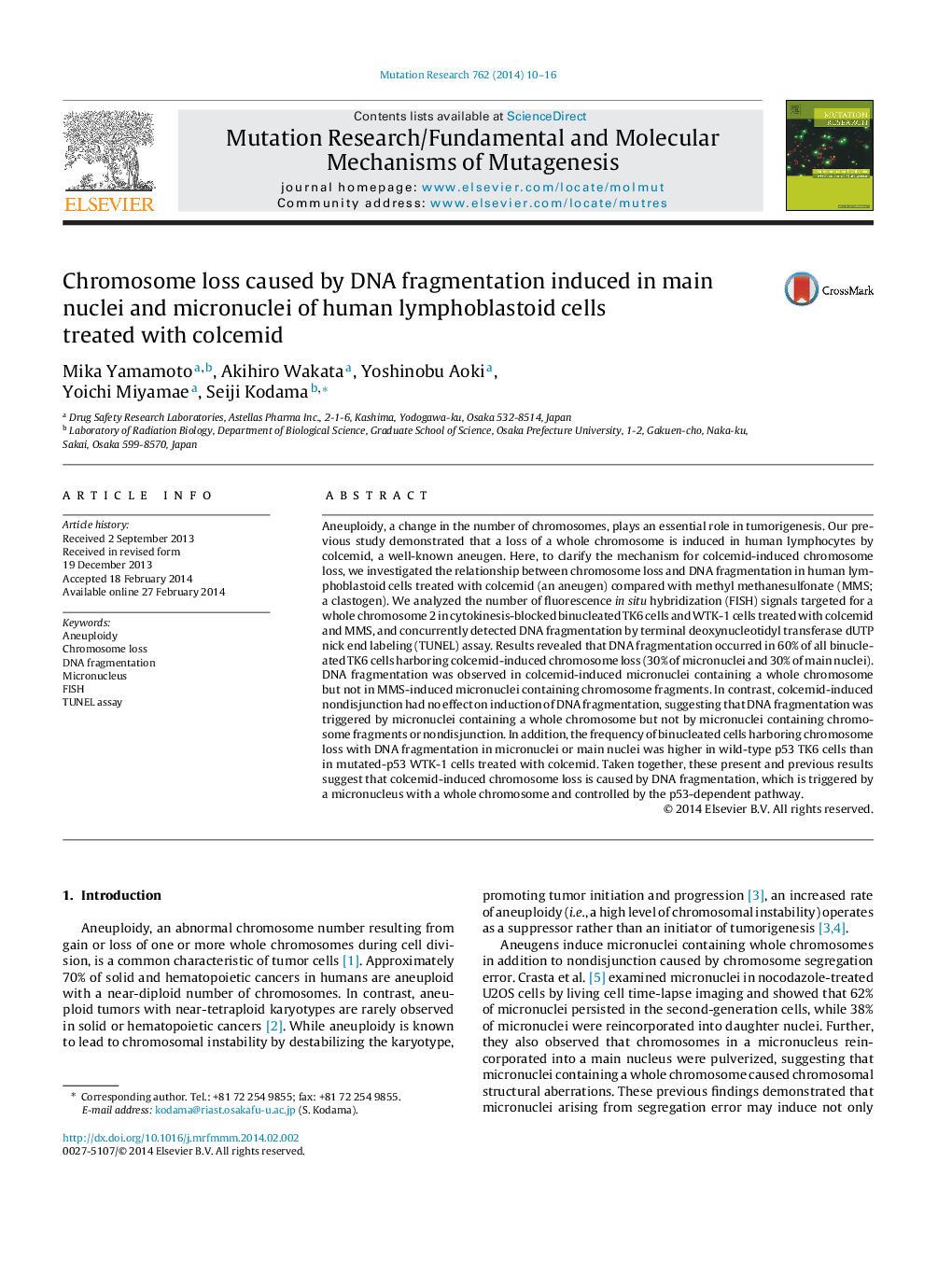| کد مقاله | کد نشریه | سال انتشار | مقاله انگلیسی | نسخه تمام متن |
|---|---|---|---|---|
| 8455823 | 1548335 | 2014 | 7 صفحه PDF | دانلود رایگان |
عنوان انگلیسی مقاله ISI
Chromosome loss caused by DNA fragmentation induced in main nuclei and micronuclei of human lymphoblastoid cells treated with colcemid
دانلود مقاله + سفارش ترجمه
دانلود مقاله ISI انگلیسی
رایگان برای ایرانیان
کلمات کلیدی
موضوعات مرتبط
علوم زیستی و بیوفناوری
بیوشیمی، ژنتیک و زیست شناسی مولکولی
تحقیقات سرطان
پیش نمایش صفحه اول مقاله

چکیده انگلیسی
Aneuploidy, a change in the number of chromosomes, plays an essential role in tumorigenesis. Our previous study demonstrated that a loss of a whole chromosome is induced in human lymphocytes by colcemid, a well-known aneugen. Here, to clarify the mechanism for colcemid-induced chromosome loss, we investigated the relationship between chromosome loss and DNA fragmentation in human lymphoblastoid cells treated with colcemid (an aneugen) compared with methyl methanesulfonate (MMS; a clastogen). We analyzed the number of fluorescence in situ hybridization (FISH) signals targeted for a whole chromosome 2 in cytokinesis-blocked binucleated TK6 cells and WTK-1 cells treated with colcemid and MMS, and concurrently detected DNA fragmentation by terminal deoxynucleotidyl transferase dUTP nick end labeling (TUNEL) assay. Results revealed that DNA fragmentation occurred in 60% of all binucleated TK6 cells harboring colcemid-induced chromosome loss (30% of micronuclei and 30% of main nuclei). DNA fragmentation was observed in colcemid-induced micronuclei containing a whole chromosome but not in MMS-induced micronuclei containing chromosome fragments. In contrast, colcemid-induced nondisjunction had no effect on induction of DNA fragmentation, suggesting that DNA fragmentation was triggered by micronuclei containing a whole chromosome but not by micronuclei containing chromosome fragments or nondisjunction. In addition, the frequency of binucleated cells harboring chromosome loss with DNA fragmentation in micronuclei or main nuclei was higher in wild-type p53 TK6 cells than in mutated-p53 WTK-1 cells treated with colcemid. Taken together, these present and previous results suggest that colcemid-induced chromosome loss is caused by DNA fragmentation, which is triggered by a micronucleus with a whole chromosome and controlled by the p53-dependent pathway.
ناشر
Database: Elsevier - ScienceDirect (ساینس دایرکت)
Journal: Mutation Research/Fundamental and Molecular Mechanisms of Mutagenesis - Volume 762, April 2014, Pages 10-16
Journal: Mutation Research/Fundamental and Molecular Mechanisms of Mutagenesis - Volume 762, April 2014, Pages 10-16
نویسندگان
Mika Yamamoto, Akihiro Wakata, Yoshinobu Aoki, Yoichi Miyamae, Seiji Kodama,